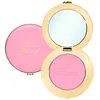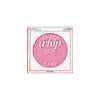What's inside
What's inside
 Key Ingredients
Key Ingredients

 Benefits
Benefits

 Concerns
Concerns

 Ingredients Side-by-side
Ingredients Side-by-side

Mica
Cosmetic ColorantAlumina
AbrasiveZinc Stearate
Cosmetic ColorantCaprylic/Capric Triglyceride
MaskingOctyldodecyl Stearoyl Stearate
EmollientMethylpropanediol
SolventCaprylyl Glycol
EmollientGlycerin
HumectantIris Florentina Root Extract
MaskingLeuconostoc/Radish Root Ferment Filtrate
AntimicrobialRetinyl Palmitate
Skin ConditioningPhenylpropanol
MaskingZinc Sulfate
AntimicrobialKaolin
AbrasiveParfum
MaskingCoumarin
PerfumingSodium Dehydroacetate
PreservativeCI 77891
Cosmetic ColorantCI 77491
Cosmetic ColorantCI 77492
Cosmetic ColorantCI 77499
Cosmetic ColorantCI 42090
Cosmetic ColorantCI 45410
Cosmetic ColorantCI 15850
Cosmetic ColorantCI 77007
Cosmetic ColorantCI 19140
Cosmetic ColorantMica, Alumina, Zinc Stearate, Caprylic/Capric Triglyceride, Octyldodecyl Stearoyl Stearate, Methylpropanediol, Caprylyl Glycol, Glycerin, Iris Florentina Root Extract, Leuconostoc/Radish Root Ferment Filtrate, Retinyl Palmitate, Phenylpropanol, Zinc Sulfate, Kaolin, Parfum, Coumarin, Sodium Dehydroacetate, CI 77891, CI 77491, CI 77492, CI 77499, CI 42090, CI 45410, CI 15850, CI 77007, CI 19140
Dimethicone
EmollientMica
Cosmetic ColorantTitanium Dioxide
Cosmetic ColorantDimethicone/Vinyl Dimethicone Crosspolymer
Skin ConditioningHydrogenated Polydecene
EmollientPhenyl Trimethicone
Skin ConditioningSilica
AbrasiveLauroyl Lysine
Skin Conditioning1,2-Hexanediol
Skin ConditioningAluminum Hydroxide
EmollientGlyceryl Caprylate
EmollientStearyl Dimethicone
EmollientKaolin
AbrasiveUltramarines
CI 17200
Cosmetic ColorantHc Red No. 20
Hc Yellow No. 4
Alternatives
Ingredients Explained
These ingredients are found in both products.
Ingredients higher up in an ingredient list are typically present in a larger amount.
Kaolin is a clay. It is used for oil control and to help minimize pores. Like other clays, kaolin has the ability to absorb excess sebum or oil. This can help clean out pores and mattify the skin.
Some types of kaolin may have exfoliating properties. When water is added to kaolin, it becomes a paste with small abrasive particles.
Most kaolin is a white color, but may be pink/orange/red depending on where it comes from.
The name 'kaolin' comes from a Chinese village named 'Gaoling'. Kaolin clay comes from rocks rich in kaolinite. Kaolinite, the mineral, has a silicate layered structure. Kaolinite is formed from chemical weathering of aluminum siilicate minerals.
Besides skincare, kaolin is commonly used to make glossy paper, in ceramics, toothpaste, and as medicine to soothe stomach issues.
Learn more about KaolinMica is a naturally occurring mineral used to add shimmer and color in cosmetics. It can also help improve the texture of a product or give it an opaque, white/silver color.
Serecite is the name for very fine but ragged grains of mica.
This ingredient is often coated with metal oxides like titanium dioxide. Trace amounts of heavy metals may be found in mica, but these metals are not harmful in our personal products.
Mica has been used since prehistoric times throughout the world. Ancient Egyptian, Indian, Greek, Roman, Aztec, and Chinese civilizations have used mica.
Learn more about Mica